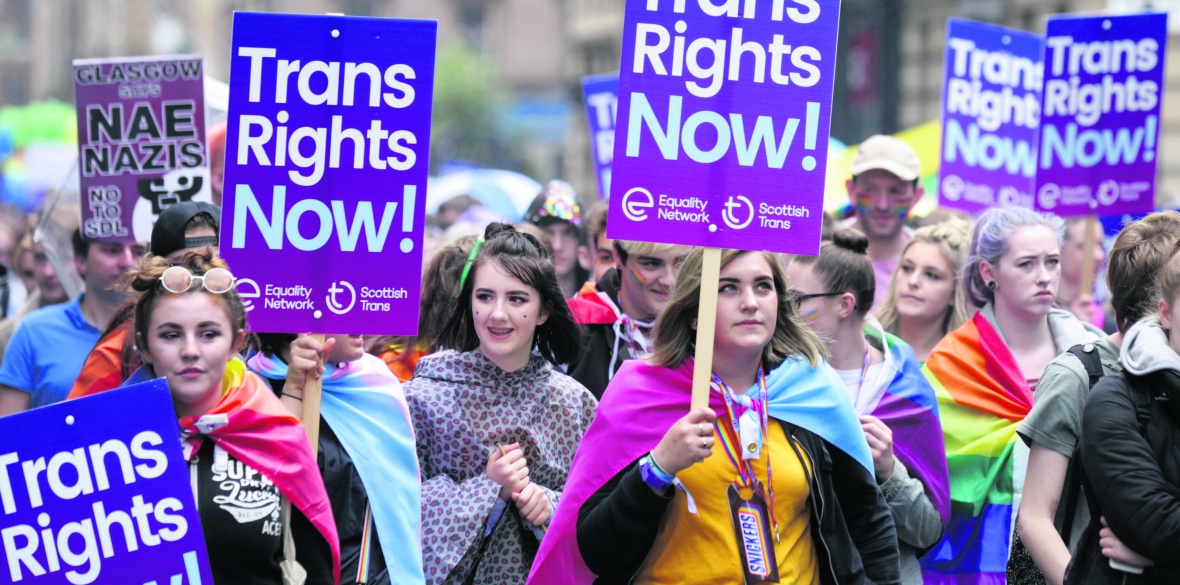This is the last article you can read this month
You can read more article this month
You can read more articles this month
Sorry your limit is up for this month
Reset on:
Please help support the Morning Star by subscribing here
FROM what I have observed recently, any deviation from the statement “trans-women are women” will at the very least result in the “offender” being publicly branded a transphobe or a “terf.”
At worst it can result in you being reported to your political party, trade union or employer and accused of hate speech or bigotry.
The impact of this modern day McCarthyism has been increasingly to drive this important debate underground and to create a climate of toxicity, fear and suspicion, the like of which I have rarely seen in over 30 years of activism in the trade union and labour movement.
Informed debate and respectful disagreement are part of the lifeblood of our movement and the right to disagree profoundly with your comrades and to offer a counter view in a well-run debate is what makes us a vibrant and progressive force.
Therefore, the silencing of large numbers of, mostly, women is not an acceptable way to conduct this debate. Nor is it the best way to address the very real issues of how society can better accept, support and include trans people.
Here we have a deeply complex issue — with significant potential consequences for society and one which requires serious thought and consideration — reduced to an oversimplified, emotive and sound-bite-rich social media confrontation that is unlikely to help the debate as it moves into the more mainstream media sphere.
So how do we begin to conduct a more responsible, respectful and informed discussion to find solutions to real concerns rather than to pit one form of discrimination against another in a “no win” scenario for the Labour Party and the wider movement?
How do we ensure that people who have serious and important questions to pose about the impact on women of possible changes to the Gender Recognition Act can feel that their concerns are heard, understood and not dismissed out of hand?
First, it is unarguably a fact that trans people suffer high levels of discrimination and disadvantage in society. And second, it is equally unarguable that women remain super-exploited, discriminated against, disadvantaged and under-represented in society.
If we can agree on those two statements, logically, we can also accept that both require and are entitled to specific protections and support to counter the conditions and circumstances that lead to this situation.
Defining what those protections and support should look like can surely be our starting point and those definitions can only be achieved through a considered and inclusive discussion with representatives of both.
Crucially, we need to consider very carefully whether a measure designed to support one person may have an unintended consequence that potentially disadvantages the other and we should be prepared to accept that potentially changing the way we define half the population should not be driven through without a proper examination of its impact.
Perhaps we also have to consider that women have rights and trans people have rights and that sometimes those rights will be the same, sometimes they will diverge and sometimes they may even conflict.
Only by applying this logic can we begin to design good, workable policy solutions that win the support of all concerned as well as wider society and surely that is our objective here.
Certainly, there is a potential for conflict, but there will always be conflicts of interest during times of change and the movement has had to consider potential conflicts in the past between young and old people, different groups of workers, religious belief and freedoms versus LGBT and women’s rights.
We managed to get through these conflicts without resorting to “no platforming,” name calling and the silencing of debate and we managed to develop inclusive and workable solutions that drew wide support.
Of course, we will always come to better conclusions and solutions when we remember that the primary reason for the oppression and exploitation of women is our class and that the ruling class have always and will always attempt to undermine the solidarity of our class.
This bitter and damaging row has all the hallmarks of an orchestrated attempt to divide the left of the labour movement and we should question who benefits most from this division.
Those of us in the trade union movement who support Jeremy Corbyn and the radical Labour manifesto have a responsibility to provide leadership and to facilitate a better debate and discussion, thereby protecting the rights that we have fought for and won together, while avoiding the adoption of potentially divisive and unworkable policies without adequate consultation taking place.
I realise that, by even writing this, I may unintentionally hurt or lose friends and comrades of both the personal and social media sort, but I cannot stand by and allow decent and longstanding women trade unionists and labour movement and community activists to be silenced and denigrated any longer.
No-one should be fearful of speaking up, offering an opinion, asking questions or feel the need to meet in secret.
I call for all those who share my views to come forward to frame a new debate, which provides a safe space for disagreements and questions to be aired, applies class-based analysis to the key questions and focuses not on blame and exclusion but on finding mutually acceptable solutions for women and the trans community.
Unity is strength and, unless dealt with promptly, these divisions will surely make us fall.
Trish Lavelle writes here in a personal capacity.








